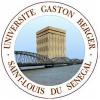Université Gaston Berger (UGB) is a very young university, having opened its doors only in 1990 in the cosmopolitan, UNESCO World Heritage site of Saint-Louis in Northern Senegal (western Africa). Created in order to establish a match between university training and the needs of the society, GBU has developed innovative, professional and oriented programs towards the exercise of creativity, scientific rigor and critical thinking. GBU offers initial, continuing and distance learning courses in fields as varied as literature, human and social sciences, legal and political sciences, economics and management sciences, medical, Agronomic, digital and physical, computer, education and sport sciences, advanced technologies and tourism management. GBU has been approved by African Union and the World Bank as African Excellence Center for Mathematics, Computer sciences and ICT.
However, the real added value of Gaston Berger University lies in the setting up of the Civilizations, Religions, Arts and Communication (CRAC) Faculty, underpinned by the desire to deepen the Africanization of the University as a high-level training center for citizens for we foresee their effective insertion into their society, culture and world. CRAC faculty has chosen to put the resources of modernity at the service of a continent conscious of its contemporaneity with other civilizations, all desirous of building a world of peace and progress. At the heart of this open Africanity are the beliefs, languages, arts and the countless knowledge and skills of Africans of yesterday and today, all mobilized in the construction of a present and a future which can be of benefit to Africa itself and to humanity as a whole. This is why, the UFR CRAC has departments including:
- the Department of African Languages, Literature and Civilizations,
- the Department of Arts and Culture,
- the Department of Heritage,
- the Department of Social Sciences of Religions.
Four Institutes serve as common services for strengthening interdisciplinarity and promoting the development of the different faculties. Those are:
- the University Library (BU)
- the Center for Research and Documentation of Senegal (CRDS) which shelters unique archives of colonial period, a museum and ancient collections of photos;
- the Institute of Open and Distance Learning (IFOAD);
- the Polytechnic Institute of St. Louis (IPSL).
GBU through the Laboratoire d’Analyse des sociétés et pouvoirs Afrique-diasporas (LASPAD), has been chosen by the Ministry of Higher Education and Research to pilot two strategic programs :
1. The service of the universities to the community: A charter of socioeconomic responsibility of universities is being drafted so that Senegalese universities can fully play their roles as centers of co-production and dissemination of knowledge in a critical and universal way, as spaces for scientific and technological innovation for the development of our towns and the countryside, sound the alarm when social and symbolic ties crack. In short, it is a matter of breaking the distance between the universities and our communities. We believe that universities must make a vital contribution to the march of our societies by reinventing the bond of solidarity, co-protection and co-responsibility that must unite us.
2. The People’s University: Our educational system, especially our traditional universities, has the mission to produce and transmit knowledge that is necessary and useful to the community. However, its modalities of operation raise the question of the degree of dissemination of knowledge in the social body. The idea underlying the People’s University is to carry out a de-academicization of knowledge. It is to make available to individuals, without age requirement, training or prior diplomas, knowledge of diverse nature that will be useful to them in their daily social activities and practices, will make them more productive in their jobs , but also make them better citizens by shedding light on the various issues related to geopolitics, history, experimental sciences, economics, institutions, etc.


